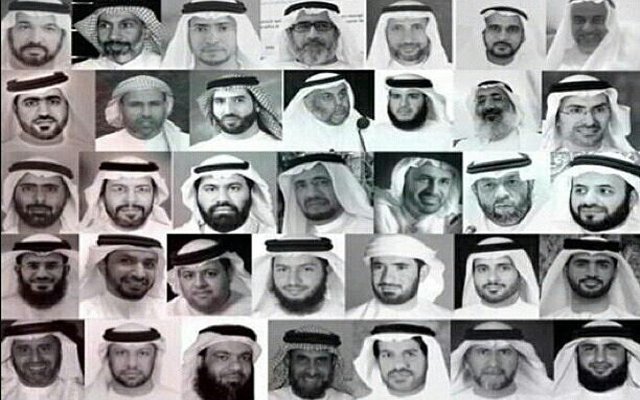Today, Americans for Democracy & Human Rights in Bahrain (ADHRB) launched an international campaign urging the United Arab Emirates (UAE) to disclose the fate of at least 60 human rights defenders, civil society activists, and Emirati political dissidents known as the “UAE 94” group who have been arbitrarily detained since 2012 for their advocacy of advocating democratic reforms in the UAE. The campaign calls for their immediate and unconditional release.
ADHRB has sent letters to the Foreign ministers of the USA, UK, Norway, Sweden, and Iceland, as well as the Foreign Affairs and human rights committees in the parliaments of the aforementioned countries. ADHRB has also been communicating with the Office of the High Commissioner for Human Rights at the United Nations, urging these entities to:
- Express grave concern over the continued detention of at least 60 individuals involved in the “UAE 94” case under arbitrary measures.
- Exert pressure through relevant diplomatic means to demand the UAE disclose the fate of the detainees and release them.
- Raise this issue in all international forums to shine light on the fate of those who have completed their sentences but still not released.
In it’s message, ADHRB highlights that over three-quarters of these political prisoners have served their sentences but remain arbitrarily detained. The UAE authorities refuse to release them, claiming they pose a “terrorist threat” based on vague laws allowing for their indefinite detention, which constitutes a flagrant violation of international human rights law. Additionally, some of these activists have been subjected to enforced disappearance, torture, and other forms of ill-treatment.
Among these activists, the organization draws attention to Khalaf Abdulrahman Al-Romeithi, who was recently extradited to the UAE by the Jordanian authorities on 17 May 2023. He was detained immediately upon his arrival at Amman airport and subjected to enforced disappearance. The UAE authorities only later announced his transfer without providing any information of his whereabouts. Al-Romeithi holds both Emirati and Turkish citizenships and was sentenced in absentia to 15 years in prison following an unfair mass trial in the “UAE 94” case. He had been living in exile in Turkey since his conviction but was extradited to the UAE in 2023 and since then has been held incommunicado. ADHRB urges international entities to demand the UAE to disclose his fate.
The UAE authorities initiated the trial of the “UAE 94” group after the activists published a petition in 2011 calling for a series of democratic reforms. The group consists of Emirati citizens from various backgrounds, including prominent human rights lawyers, student leaders, academics, judges, and teachers. Their primary objective was to promote democratic principles by exercising their rights to freedom of expression and peaceful assembly.
- On 26 March 2012, the authorities began arresting the 94 activists and continued with further arrests in the following months.
- On 4 March 2013, the collective trial of those known as the “UAE 94” group commenced, failing to meet the minimum standards of a fair trial. The convictions were based on their peaceful exercise of the right to freedom of expression, association, and assembly. The trial proceedings took place over 13 sessions between March and May.
- On 2 July 2013, the State Security Chamber announced that out of the 94 defendants, 69 had been convicted of establishing an organization with the intention of overthrowing the government.
- The court sentenced five defendants to seven years, 56 defendants to ten years, and eight defendants (tried in absentia) to 15 years. The court acquitted 25 individuals.
- In February 2014, the Working Group on Arbitrary Detention (WGAD) issued a report to the United Nations General Assembly, in which it concluded that the detention of the 94 individuals was arbitrary, and that their convictions were based on charges related to the exercise of freedom of expression and assembly.
These activists have been subjected to various forms of torture and mistreatment, including beatings, upside-down hanging, suffocation from smoke, prolonged solitary confinement, electric shocks, denial of medical care, and inadequate facilities for heating, sleeping, prayer, and toilets. Despite this, the UAE’s judge deliberately ignored their claims of torture and refused to investigate these allegations. In some cases, the prosecutor’s arguments heavily relied on confessions extracted under torture from the defendants.
The continued, unjustified, and indefensible detention of these activists by the UAE violates the International Covenant on Civil and Political Rights, the United Nations Convention against Torture, and other forms of cruel, inhuman, or degrading treatment or punishment, despite the UAE’s accession to these conventions in 2012. Therefore, the ADHRB organization calls on various international entities to pressure the UAE to release them unconditionally.





